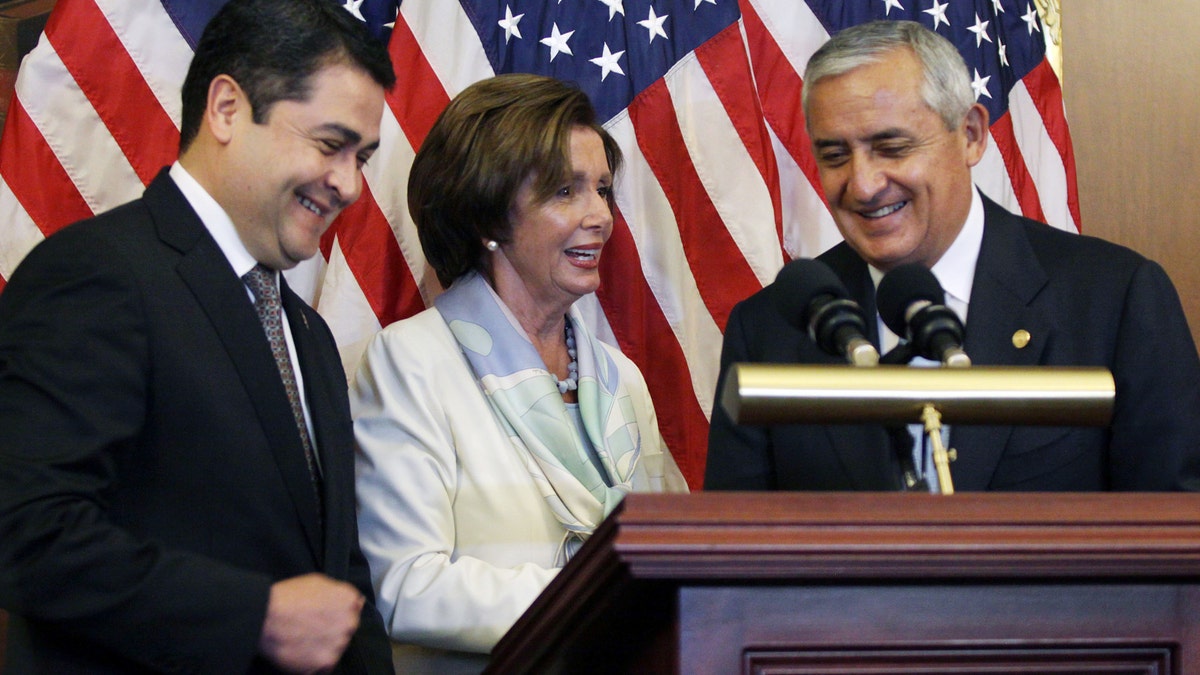
Rep. Nancy Pelosi with Guatemalan President Otto Molina, right, and Honduran President Juan Hernández. (ap)
Honduran President Juan Orlando Hernández said Thursday that his government has actively tackled human smugglers in his country, arresting approximately 12 of them in less than month.
Speaking Thursday at the Center for Strategic and International Studies (CSIS) in Washington, Hernandez, under pressure by the U.S. government to help stem the influx of Hondurans entering the United States illegally, stressed that his administration is taking steps to address the problem on their end.
On Friday, the presidents of Honduras, Guatemala and El Salvador are scheduled to meeting with President Obama at The White House to discuss the long-climbing number of unaccompanied minors from those three countries crossing the U.S.-Mexico border.
The U.S. has been urging their governments to take steps to stem the exodus of children and warning that the U.S. will take steps to send them back promptly.
“This number may seem small, but for a country like Honduras (the 12 smugglers) represents nearly 50% of all smuggling criminals, and we have arrested them in a record time of a month,” Hernandez told Fox News Latino.
Hernandez noted that the exodus of children and families from Central America is rooted in the violence tied to new alliances between drug cartels and local gangs.
He said efforts in his homeland to control violence has also targeted drug trafficking in the region. The president said that drug trafficking reduces opportunities to reinvest money in education and other areas that would improve conditions for Hondurans.
Hernandez also said that his administration has reinforced special surveillance at the borders, and closed its immigration department after the discovery of many corrupted officials who were working with human smugglers. He also said Honduras is carrying out ongoing investigations in cooperation with Guatemala and El Salvador in hopes of arresting more members of criminal organizations that are exploiting and profiting from the surge of illegal border-crossers.
At the same time, Hernandez reiterated that the cause of the surge is not just in Central America, and the problem is not one for just Central American nations to resolve.
He said that human smugglers are part of a bigger and stronger network of organized crime that has benefited from the “ambiguity from the U.S. unresolved immigration reform.”
“Human smugglers have also another face, that of those arm traffickers,” he said. “This monster (organized crime) has a foot in Central America, one in Mexico and one here in the U.S., that's why in Central America we think (tackling this problem) is a shared responsibility.”
Guatemalan President Otto Perez Molina and El Salvadoran President Salvador Sanchez Ceren will be at the White House on Friday.
President Obama has asked Congress for $3.7 billion in emergency spending that contains $300 million to help the Central American government repatriate and reintegrate migrants that are sent back.
Meanwhile, the flood of children crossing the Mexican border illegally and without their parents has slowed down in recent weeks, according to two senior administration officials.
Border Patrol agents in the Rio Grande Valley in South Texas have found fewer than 500 children crossing the border illegally this week, the officials said. Last month, agents arrested as many as 2,000 child immigrants a week.
The Obama administration has been struggling to deal with a flood of more than 57,000 children traveling alone since Oct. 1. Homeland Security Secretary Jeh Johnson said earlier this month that as many as 90,000 unaccompanied child immigrants could be apprehended by the end of the budget year in September. Most of the children are from Honduras, El Salvador and Guatemala.
Customs and Border Protection has launched a public relations campaign to warn would-be immigrants and their families in Central America that the trip to the U.S. border is dangerous and immigrant children will face deportation after they are apprehended. But since the trip through Mexico can take weeks or even months, recent border crossers are unlikely to have seen much of the campaign.
In Washington, at the Center for Strategic and International Studies, Hernandez and Guatemalan President Otto Pérez Molina agreed that they can´t tackle the surge of unaccompanied children crossing the U.S. border alone and asked the U.S. to look at assistance it gives the region as a long term investment.
“We are not avoiding our responsibility, as a country we are doing everything within our reach…” said Pérez Molina in Spanish at CSIS.
By explaining that to see results, there needs to be mutual cooperation with the United States, President Pérez Molina said any financial effort backed by the U.S., similar to the one provided in previous years to Colombia when it battled drug cartels, should be looked at in Central America as a five to 10 year investment towards the improvement of the region.
During their visit in Washington, the Central American heads of state also met with members of Congress to share their views on the immigration crisis at the border.
Ending his speech before a pack audience at CSIS, the President of Honduras said more aggressive cooperation is needed and warned “we will not be able to solve this problem unless we go to the root and this requires an integral task, one that is based on the principle of shared responsibility. The U.S.A. is responsible, and we are responsible, and we facing up to our responsibility.”
The Associated Press contributed to this story.
Follow us on twitter.com/foxnewslatino
Like us at facebook.com/foxnewslatino




